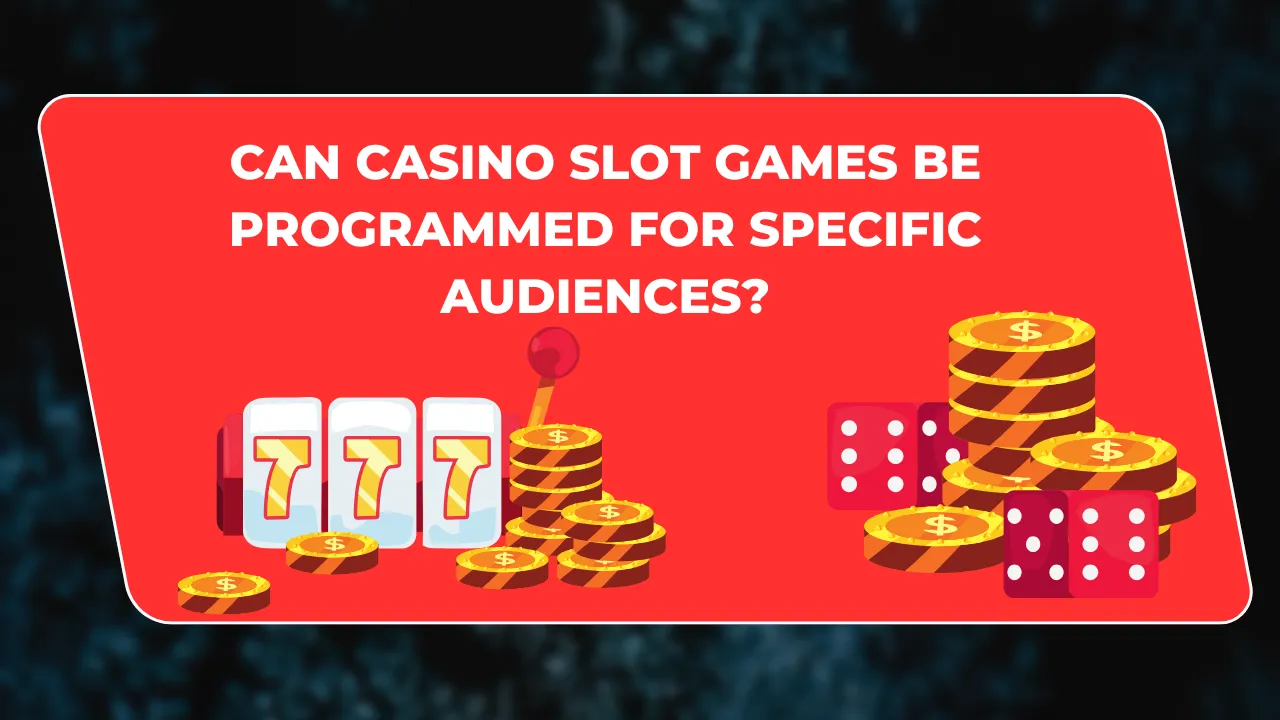Slot machines are among the most iconic symbols of gambling, both in land-based casinos and in the online gaming world. With their flashing lights, immersive themes, and potential for big wins, slot games remain a favorite for millions of players. But beyond their surface appeal, many people wonder: can slot games actually be programmed for specific audiences?
The short answer is yes — but not in the way most conspiracy theories suggest. Casinos and game developers don’t program slots to favor or cheat specific individuals. Instead, slot games are carefully designed to appeal to player demographics, cultural trends, and even psychological triggers. Understanding how this works can provide valuable insights into the modern gaming industry and how slot games continue to evolve.
The Science of Slot Game Design
Slot machines may look simple on the outside, but their development involves complex programming, advanced mathematics, and deep market research. Game developers use random number generators (RNGs) to ensure fairness, which means that every spin is independent of the last. However, beyond the core mechanics, developers make dozens of creative decisions to shape the player experience.
Themes are a prime example. A slot machine designed for a European market might draw on local folklore, sports, or popular TV shows. In contrast, a slot targeted at an Asian audience may feature dragons, lucky numbers, or cultural icons. Developers know that the look, sound, and story of a game can be just as influential as its payout structure when it comes to drawing in players.
In the online world, operators catering to different niches often promote games tailored to their audience’s interests. This is where targeted programming truly shines, not in changing outcomes, but in shaping the overall experience to match what specific groups find entertaining.
How Casinos Use Demographic Insights
Casinos invest heavily in research to understand who their customers are and what they want. Age, location, cultural background, and even playing habits all inform how slot games are presented.
For example, younger players who grew up with video games are more likely to enjoy interactive bonus rounds, skill-based features, and high-quality graphics. Older generations, on the other hand, may prefer simpler, classic three-reel slots that remind them of traditional machines.
Online casinos have even more tools at their disposal, as they can track player behavior in real time. They use this data to recommend games, shape loyalty programs, and highlight features that match a player’s profile. This doesn’t mean the outcomes are manipulated — fairness is still protected by regulators — but the experience is increasingly personalized.
The Role of Casinos Outside GamStop
The concept of tailored slot games becomes even more interesting when looking at platforms like casinos not on gamstop. These casinos often operate outside the UK’s self-exclusion program, which gives them more flexibility in the kinds of games they can offer. While still required to maintain fairness, they can experiment with themes, payout structures, and features in ways that mainstream operators may avoid.
This freedom allows them to test innovative ideas and cater to specific international audiences. For instance, they might launch a slot themed around a niche cultural reference or offer mechanics designed for high-risk players seeking volatility. While these casinos attract controversy due to lighter regulation, they highlight just how much customization is possible in the slot game industry.
Psychological Programming in Slot Games
Beyond demographics, slot games are programmed with psychological principles in mind. Game developers know that the way players perceive wins and losses is just as important as the actual odds.
“Near misses” are one example. When a player gets two matching symbols and the third symbol just misses, it creates a powerful urge to keep spinning. Similarly, small but frequent wins can keep players engaged for longer, even if those wins don’t cover the full stake.
Sound and visuals also play a huge role. The celebratory jingles, flashing animations, and even tactile feedback on mobile apps all serve to reinforce the thrill of the game. These features aren’t designed to cheat players, but they do maximize engagement and ensure the game feels rewarding.
Regional Trends and Cultural Influence
Programming slot games for specific audiences often involves studying cultural trends. In North America, branded slots tied to movies, celebrities, or sports are extremely popular. In contrast, Scandinavian markets often favor clean designs and straightforward mechanics, reflecting regional tastes for simplicity and transparency.
Developers are quick to adapt to new cultural phenomena too. If a TV show, band, or video game becomes globally popular, it’s not unusual to see themed slots emerge shortly after. This responsiveness allows casinos to remain relevant and attract diverse player bases.
Regulation and Fairness Standards
It’s important to stress that while slot games can be tailored for specific audiences, they cannot legally be rigged to disadvantage certain players. Regulators around the world — including the UK Gambling Commission, the Malta Gaming Authority, and others — require games to use certified RNGs. These ensure that the odds remain consistent regardless of who is playing.
Game audits, payout percentages (RTPs), and licensing requirements all act as safeguards. While operators can choose which games to feature and how to market them, the underlying mechanics must remain fair. Any casino caught manipulating outcomes would face heavy fines and likely lose its license.
The Future of Personalized Gaming
Looking ahead, slot games are only going to get more personalized. With advances in artificial intelligence and machine learning, casinos could soon recommend games not just based on general demographics, but on individual behavior patterns. Imagine a system that automatically adjusts bonus offers, themes, or even volatility settings to match how you play.
Some operators are already experimenting with hybrid games that combine slots with role-playing mechanics or interactive storylines. These innovations appeal to audiences looking for more depth than traditional slot machines provide. As gaming technology advances, the line between casino entertainment and mainstream video gaming is likely to blur further.
Conclusion
So, can casino slot games be programmed for specific audiences? Absolutely — but within limits. Developers don’t change the odds for different players, but they do customize themes, features, and experiences to attract specific demographics. From cultural references to psychological triggers, the design of slot games is far more strategic than many players realize.
Casinos, especially online platforms with greater flexibility, have become experts at tailoring these experiences to match player expectations. For audiences, this means more engaging and personalized games. For casinos, it means higher retention, deeper engagement, and stronger brand loyalty.
As technology continues to evolve, we can expect even more sophisticated programming that blends entertainment with fairness. The future of slots isn’t just about random spins — it’s about creating immersive experiences designed for the people who play them.









